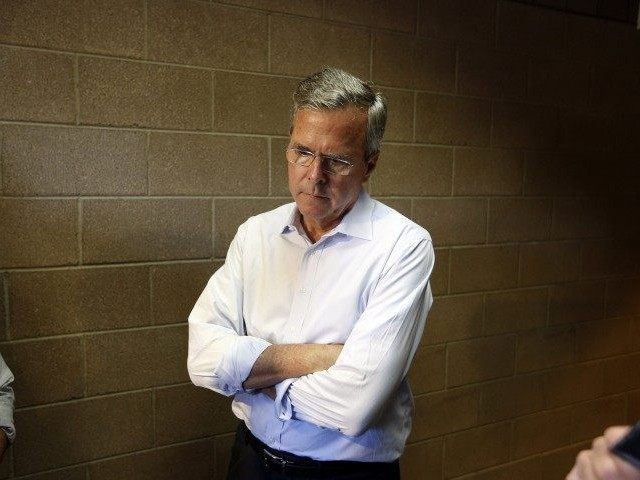Gov. Jeb Bush has released a Spanish-language Internet ad, in which his Mexican-born wife makes her first appearance of the campaign to deliver a halting, accented and simple English pitch, while he speaks happily in confident Spanish.
Columba Bush rarely speaks in public, and English is not her native language. She was born in Mexico, and moved to the United States with Jeb Bush.
Her 15-second scripted comments are very simple. “I have lived more than half my life here. So, you know, I agree that we all have the same interests, the same feelings. We go to church every Sunday. We have celebrations with the family. We keep our traditions. You know, but at the end it’s just that, you know, faith, friends and family.”
In contrast, Bush smiles broadly as he speaks Spanish throughout the 1 minute video.
Columba can speak English. But she’s much more confident when speaking in Spanish.
In 2003, she gave a heavily-accented speech on anti-drug measures.
In 1998, she spoke well and pleasantly — in Spanish — for a Bush campaign ad.
In 2011, she spoke animatedly and well when giving a Spanish-language tour of the Florida governor’s mansion.
Columba’s limited English-language abilities may hurt Bush’s outreach to GOP voters. Polls show Bush stuck below 10 percent in New Hampshire, at 5 percent in Iowa, and 8.5 percent in South Carolina.
In the new Spanish-language campaign ad, Bush praises migrant Latinos’ foreign culture, which is distinctly different from American’s English-language culture. “Pari mi, la cultura Hispana es muy importante y positiva,” said Bush, who is a candidate for the presidency of the United States of America.
“For me, Hispanic culture is very important and positive.”
“Los Hispanos contribuyen cada dia mas a nuestra cultura, son parte integral del sueno Americano,” said Bush, who described himself as Hispanic in a 2009 registration form.
“Hispanics contribute every day more to our culture [and] are an integral part of the American dream.”
“Pos esos motivos y ms, yo los invito a que celebren el mes de la herencia Hispana, porque todos somos Americanos,” said Bush, who is the descendent of white, Anglo-Saxon Protestants ancestors.
“For these reasons and more, I invite you to celebrate the Hispanic Heritage Month because we are all Americans.”
Bush’s foreign-language outreach to the Latino slice of U.S. voters is unlikely to yield any benefits on the campaign trail. Most Hispanic voters are concentrated in a few Democratic-dominated states, and they tend to back the Democratic Party.
In contrast, most of the GOP’s Latino support comes from third-generation Hispanics, many of whom consider themselves core Americans, speak English and worry about their neighborhoods and schools being damaged by the inflow of low-skill migrants who can’t speak English.
The GOP’s 2012 candidate, Mitt Romney, would have had to win 73 percent of the concentrated Hispanic turnout to flip enough states to win the 2012 election, unless he also increased his share of core voters, who comprise 70 percent of the electorate.
In 2012, Romney won 27 percent of the Latino vote, only slightly below Sen. John McCain’s 32 percent in 2008.
Polls show that Bush’s rival, Donald Trump, is getting up to 31 percent support among Hispanic voters, largely because of his optimistic, post-racial pitch to all Americans.
Trump has also-tweaked Bush for his “dog whistle” to Latino voters. “I like Jeb,” Trump told Breitbart News. “He’s a nice man. But he should really set the example by speaking English while in the United States.”
Bush subsequently tried to defend his narrow pitch to Spanish-speaking voters, including his decision to speak Spanish to an young American student, and his emotional commitment to Latino culture.
“[T]hese young beautiful kids all speak English but also speak Spanish and one of them asked me a question in Spanish and I answered it. That’s the reality of America, that’s the goodness of America. That’s the kind of America we want,” he said, echoing his fervent support for the fracturing of the culturally coherent United States into a myriad rival cultural identities.
“This is a diverse country,” Bush insisted. “We should celebrate that diversity and embrace a set of shared values.”
In fact, academic studies show that social variety — or government-imposed cultural diversity — damages trust and civic cooperation, and also undermines the health of minorities, such as African-Americans and Latinos.
However, diversity is good for governments and well-educated professionals — including media professionals — because it increases demand for the oversight, regulation, mediation and repair of proliferating social conflicts. It also provides a pool of cheap, unorganized labor for companies and for professionals seeking to hire domestic servants.
Follow Neil on Twitter, @NeilMunroDC

COMMENTS
Please let us know if you're having issues with commenting.